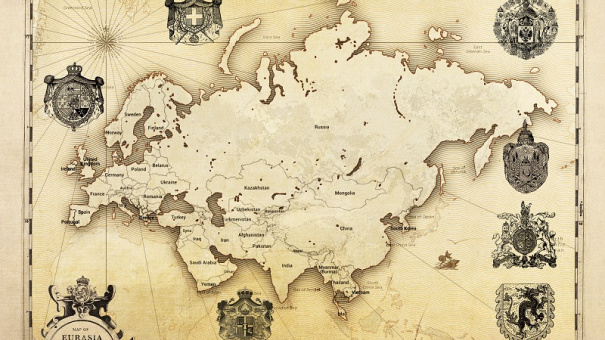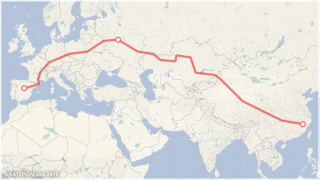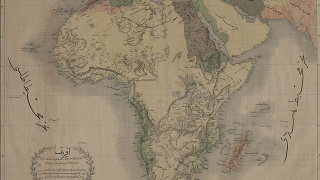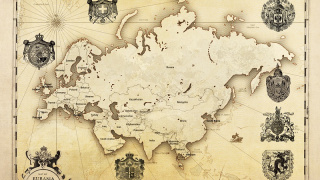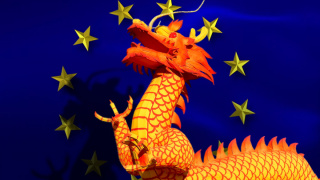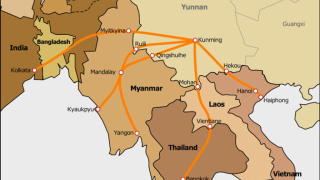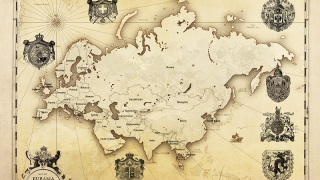Why the Chinese leader’s “Roman Holiday” scared the US
The Italian government has decided to open its ports to investors from China, which promises an increase in cargo turnover and considerable benefits. The signing of the relevant memorandum is expected during the visit of PRC President Xi Jinping to Rome in late March, according to the New York Times.
The high probability of signing the document was indicated by Italian Deputy Minister of Economic Development Michel Geraci. This greatly frightened the United States. Rome was mistaken and such a decision “could harm the global reputation of this country in the long term,” said the official representative of the US National Security Council Garrett Marquis.
If the signing of the agreement with China takes place, Italy will become the first country of the Big Seven, which will actively participate in Beijing’s plans to create cargo hubs around the world to stimulate its own economic growth as part of the One Belt - One Road Megaproject.
The contract with the Italians is very important for the Chinese.
Italy has a unique position in Europe: a large number of ports, the country is among the top three countries in maritime trade. It is assumed that containers from China will arrive in Trieste, Venice, Ravenna, and further Chinese goods will diverge in all European markets. This is a strategically important part of the New Silk Road, which allows China to quickly and cheaply exchange goods with the EU.
Control of cargo ports is an important part of the Chinese policy of “One Belt - One Road”. However, not every port is suitable for China. He needs cargo ports that can take ships of large displacement. But there are not many such ports in Europe. Most European ports are technically unable to accept huge container ships from China.
China in the 80s of the last century for the sake of increasing the profitability of maritime transport actually changed the rules of the game on the market. Due to its policy, the capacity of sea container ships has seriously increased: then the largest tonnage of the fourth type was up to 4 thousand TEU, and then it was necessary to add new classes with a capacity of up to 20 thousand TEU.
But this required the restructuring of the channels. Such large ships simply could not pass. Therefore, China has invested a lot of money in the reconstruction of the Panama Canal and the Suez Canal, which just goes into the Mediterranean Sea. However, further huge containers from China are forced to go past Spain and France to Rotterdam or Hamburg. Only these ports are capable of receiving Chinese vessels with a large displacement. They are unloaded there, and cargoes are transported by smaller ships to other ports or by land.
Not surprisingly, the main trading partners of China in Europe today are the Netherlands and Germany.
The need to sail to Rotterdam or Hamburg creates an additional transport link, which increases the cost of delivery. China wants to invest in Italian ports so that they can accept huge containers of Chinese cargo. This will not only reduce the delivery of goods and reduce the cost of logistics, but also increase Chinese exports to European countries.
What investment in ports does China offer? First, it is the deepening of the channel itself. Secondly, the complete restructuring of mooring facilities. Thirdly, it is the restructuring of all port facilities - cranes, loading and unloading ships, etc.
China is doing the right thing by investing in deepening Italian ports. However, the payback of such projects is large, so China will demand guarantees of return on investment, regardless of the change of government in the country and other problems.
What does China usually do? He immediately creates his own special rights venture or joint venture, where China plays the main role. The Chinese company acts as the management company, as, for example, in the case of the Panama Canal.
Earlier, China, by the way, had already acquired the Greek port. In 2017, the Chinese state-owned company COSCO bought a controlling stake in the Greek port of Piraeus for 350 million euros. This port is already causing problems to Rotterdam and Hamburg, as it took over part of the cargo from China and from other Asian countries.
Many countries themselves offer such deals. For example, last year Latvia and Lithuania offered China, in fact, the same deal as Italy. But the deal did not go, since it was probably not very profitable for China.
The United States, of course, will put pressure on Italy in every possible way so that it turns the gates to Beijing.
If China really gains control of the Italian ports, the ports of the Mediterranean, especially the Greek and Italian, will be under the full control of Beijing. The United States is worried because the Chinese will be able to switch part of their trade flows from the United States to Europe and become less dependent on exports to the United States. Apparently, export diversification is part of China’s policy after the start of trade wars with the US.
Moreover, Italy is likely to be criticized for its behavior by a number of European countries. Europe, in fact, also fears an increase in Chinese influence, there is a lot of confer on this topic. The French president directly told Trump: “Let's cooperate, we have a common problem - China.”
On the other hand, the EU cannot refuse the flow of Chinese investment. The largest EU countries - Italy, France, Germany - are happy to accept them. This contradiction will remain in the coming years: the growth of cooperation with China while simultaneously trying to contain its expansion.
Many countries in Europe are not just afraid of China, but are beginning to screen Chinese investment, that is, to see how Chinese investment can threaten the local economy. Europe, including Italy, is in dire need of investment. There is some confrontation between analysts and political scientists.
Actually, if the largest European economies do not disdain to take money from the Chinese, then why can't this be done to poor Greece and Italy experiencing serious problems?
Italy, like any other poor country, needs investment. Moreover, she really needs them.
In recent years, the country has experienced a severe recession in the economy, unemployment is growing, it’s hard to believe, but young people are leaving the country, the birth rate is falling. The employment level of Italians is even lower than in Greece, so new jobs, economic growth is very important for it now, and the expansion of cooperation with China promises it all.
